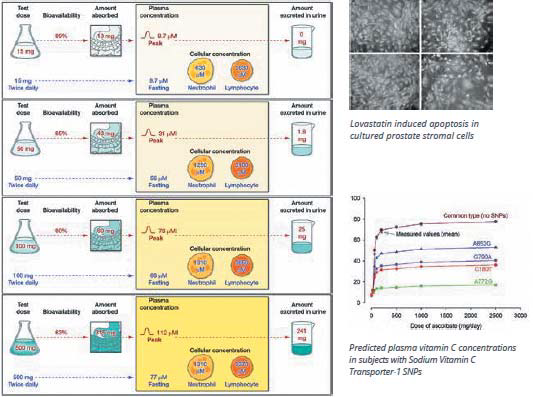
Centre for Human Genetics
Bangalore.

Bangalore.

Sebastian Joseph Padayatty, PhD
(Adjunct Faculty)
PhD, University of Leeds, UK Fellowship in Endocrinology, Baylor College of Medicine and the University of Texas, Houston, USA
I am interested in clinical research studies in general internal medicine, aimed at detailed understanding of endocrine and metabolic processes in normal and disease states. Using exhaustive data (at the US National Institutes of Health) on vitamin C dose- concentration relationships in normal men and women, we modelled vitamin C plasma concentration at low and high intakes of the vitamin. These studies provide new insights into the under-appreciated differences in dosedependent plasma vitamin C concentrations that are in the physiological (and antioxidant) range at ordinary dietary intakes of the vitamin and the very high (pharmacological and pro-oxidant) concentrations following large intravenous doses. The data were also used to predict the effects of single-nucleotide polymorphisms (SNPs) in the genes that encode vitamin C transporters on plasma vitamin C concentrations and to describe vitamin C flux in normal young women. I am currently extending these studies to larger, more diverse populations and to disease states. Marginal vitamin C status may be deleterious to health even without frank clinical illness. Population studies of vitamin C status in conjunction with identification of vitamin C transporter SNPs will give us better insight into individual variations in vitamin C physiology, and, possibly, susceptibility to deficiency state. Because vitamin C has to be obtained exogenously from food, and it can be relatively easily measured, the genetics and mathematical models of vitamin C physiology are both conceptually and practically easier to study than those of most other nutrients. Another area of interest is how glucose and nutrient absorption is modified by long-term dietary intake in humans; that is, how the gastrointestinal system adapts to different types of foods, as is the case in many animals. Such changes may play a role in obesity and in type II diabetes, both now common problems. Patients with type II diabetes have many abnormalities most of which are not corrected by current conventional treatment. Consequently the underlying abnormalities are not measured or even considered, except in a few studies. My particular interest is in integrating insights from basic science research across human biology with clinical studies of complex disorders such as type II diabetes. Using the experience gained from previous studies on measurement of body composition, exercise capacity, coagulation parameters and endocrine testing, we are attempting to characterise type II diabetes in detail in each patient, and to reverse each abnormality rather than correct elevated blood glucose alone. Emphasis is placed on detailed measurements of metabolic and physiological parameters in individual patients. This is also an opportunity to study the role of genetics in the causation of each specific defect in type II diabetes and their possible reversal

Vitamin C flux in normal women
Selected publications:
1.Comparison of measures of body composition in a trial of low dose growth hormone replacement therapy. Clinical Endocrinology, 37: 453-459 (1992). Orme SM, Sebastian JP, Oldroyd B, Stewart SP, Grant PJ, Stickland MH, Smith MA, Belchetz PE 2.Lovastatin induced apoptosis in prostate stromal cells.The Journal of Clinical Endocrinology and Metabolism, 82: 1434-1439 (1997).Padayatty SJ, Marcelli M, Shao TC, Cunningham GR 3.A new recommended dietary allowance of vitamin C for healthy young women.Proceedings of the National Academy of Sciences USA, 98: 9842-9846 (2001).Levine M, Wang Y, Padayatty SJ, Morrow J 4.Vitamin C pharmacokinetics: Implications for oral and intravenous use. Annals of Internal Medicine, 140: 533-537 (2004). Padayatty SJ, Sun H, Wang Y, Riordan HD, Hewitt SM, Katz A, Wesley RA, Levine M 5.Vitamin C: the known and the unknown and Goldilocks.Oral Diseases, 22: 463-493 (2016).Padayatty SJ, Levine M
Copyright © 2011 - All Rights Reserved - Taurus Hard Soft Solutions Pvt. Ltd
Stay Up to Date With Whats Happening